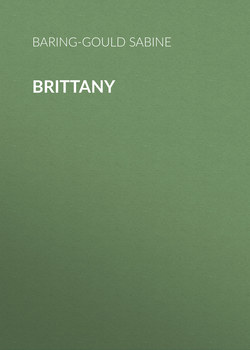Читать книгу Brittany - Baring-Gould Sabine, Baring-Gould Sabine - Страница 6
V. The Pardons
ОглавлениеThe Pardons are the religious gatherings of the people, not often in the towns, but about some chapel on an island, on a hill top, in a wood. There may be seen the costumes in all their holiday beauty.
A Pardon begins with vespers on the night before the Feast. Pilgrims arrive for that, and sleep in the church, the chapel, under hedges. They sing their cantiques or hymns till they sing themselves to sleep. The first mass is said at 3 A.M. and the true pilgrims communicate till the last has received, when they depart. An ordinary visitor arriving, say at 10 A.M., will hardly see a single pilgrim. The rest come to join in the devotions. They attend mass, take part in the afternoon (3 P.M.) procession, and buy memorials, and ribbons, and sweetstuff, and pictures at the stalls.
Almost every Pardon has a character of its own, and a description of one by no means attaches to all. In Côtes-du-Nord the Pardon is only found genuine in the Breton speaking portion, elsewhere it has degenerated into an ordinary village feast.
Sometimes, and in some places, there is an evening procession carrying lighted candles, in some a bonfire figures lighted by a figure of an angel which descends from the chapel or church spire. At some there are wrestling and games in the afternoon, at others there is dancing, but usually all is quiet and the peasants disperse after the afternoon procession.
By the sea, the arrival of the boats with maidens in white and banners is a pretty sight; at one Pardon, the sailors proceed, barefooted in their shirts, in performance of a vow, when delivered in a storm.
A visitor who desires to be present at one of the most popular Pardons should secure rooms a month beforehand, and even then he may be dispossessed if the Government or military authorities have seized on the occasion of a Pardon to billet a regiment on the place, an experience the writer has twice had to undergo.
Another quarter century will probably see the last of the Pardons. It will not be due to the decay of the religious feeling among the people – that need not be feared – but to Governmental opposition, and the indecent behaviour of the tripper, which will perhaps induce the clergy to discourage them. (Matt. vii. 6.) A word to the invariably courteous and kindly curé will often secure for the visitor a place of vantage in the gallery, and it is only due to him to ask if he objects to a snap-shot with the kodak at the procession. To photograph a man when engaged in his devotions, or a woman making her painful pilgrimage barefooted is not calculated to impress the peasant with the good-feeling of the English visitor. The Breton is tender-hearted and sensitive, and should ever be respected. At a great Basse-Bretagne Pardon and fair, one may wander till late among the thousands gathered there, enjoying themselves on merry-go-rounds and at shooting stalls, and see no horseplay, no rudeness, no drunkenness.
At a Pardon one sees and marvels at the wondrous faces of this remarkable people: – the pure, sweet and modest countenances of the girls, and those not less striking of the old folk. "It is," says Durtal (En Route), "the soul which is everything in these people, and their physiognomy is modelled by it. There are holy brightnesses in their eyes, on their lips, those doors to the borders of which the soul alone can come, from which it looks forth and all but shows itself."
Goodness, kindness, as well as a cloistral spirituality stream from their faces. One incident may be noticed to show of what stuff their charity consists. After the wreck of the Drummond Castle when the bodies were washed up on the Ile-Molène, the women readily gave up their holiday costumes – costumes which it takes a girl twenty years of economies to acquire – and in these they clothed and buried the dead women washed ashore.
The Pardons in the Bigauden district are the most showy. The Bigaudens delight in bright colours, but they are not a religious or a moral people, and they do not exhibit the fervent and deep-seated piety of the genuine Bretons. The Bigaudens occupy the promontory of Sizun and Pont l'Abbé. This people, peculiar in appearance and distinct in character from the Bretons, are supposed to belong to the primitive population of Ivernians before the coming of the British colonists. They are looked on with mistrust, if not aversion by the Bretons, whom they can generally over-reach in a bargain.
